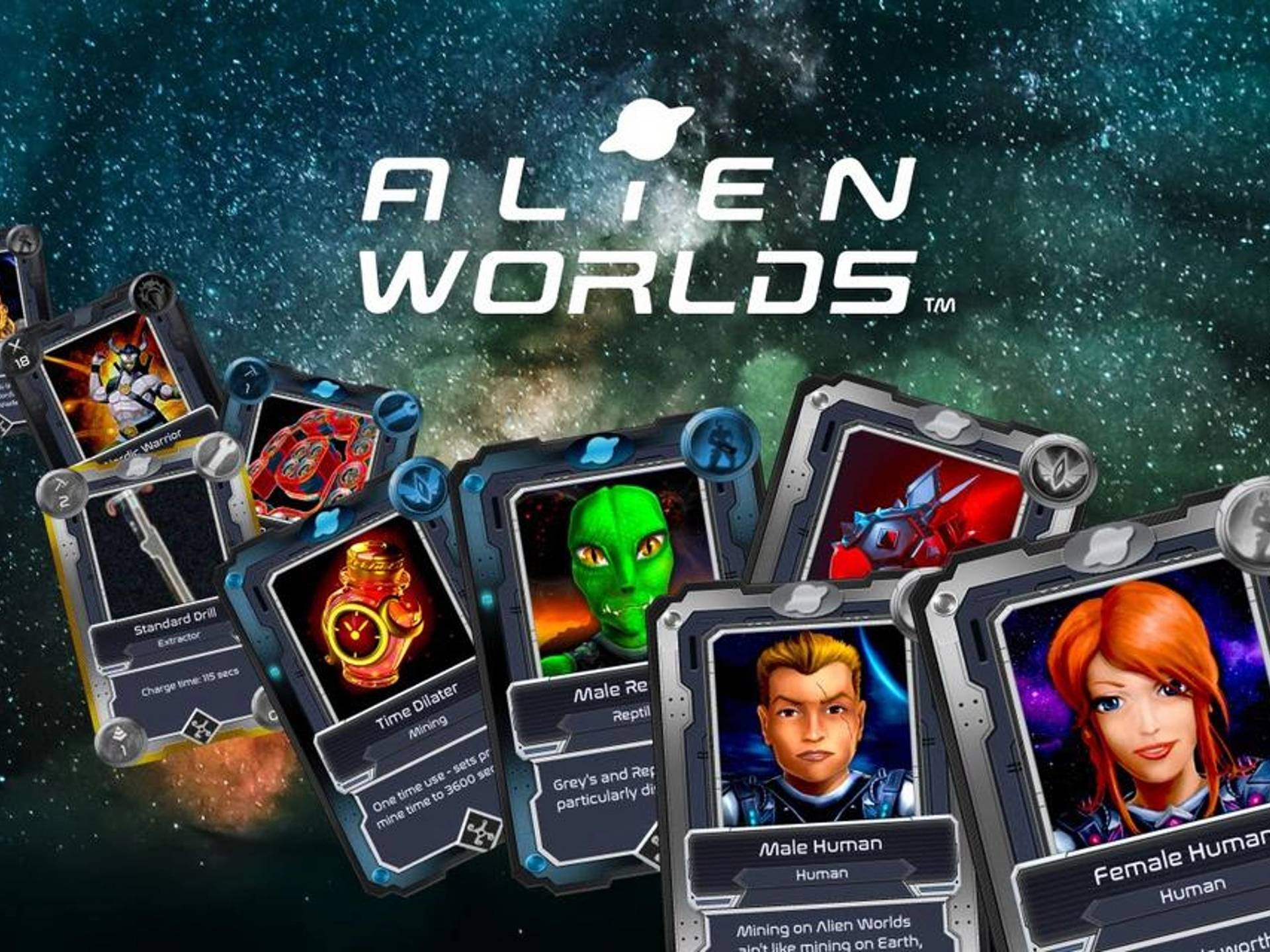위키 구독하기
Share wiki
Bookmark
Alien Worlds
0%
Alien Worlds
Alien Worlds는 이더리움, WAX 및 바이낸스 스마트 체인 블록체인에서 실행되는 분산형 메타버스(즉, 확장 가능한 플랫폼)입니다. 메타버스 통화인 트릴리움(토큰 기호 TLM)은 탐험가들이 게임을 하도록 장려하며, 사용자는 거버넌스에 참여하기 위해 스테이킹해야 합니다. 메타버스 내의 행성은 중앙 메타버스 스마트 계약으로부터 매일 트릴리움을 받는 분산형 자율 조직입니다.[1][2]
탐험가들은 채굴, 토지 획득 및 임대, 행성 거버넌스 투표를 통해 트릴리움 및 NFT(Non-Fungible Token) 지급에 영향을 미치고, 행성이 자체 게임 및 NFT를 제공함에 따라 시간이 지남에 따라 확산될 가능성이 있는 기타 전략적 행동에 참여합니다.
탐험가들은 게임의 기본 토큰인 트릴리움을 더 많이 획득하고 영향력을 키우기 위해 희귀하고 독특한 NFT를 축적하고 사용합니다.
더 많은 행성을 만들 수 있습니다. 이는 기존 행성에 불이익을 주지 않는 방식으로 수행될 예정입니다. 행성은 블록체인 커뮤니티가 Alien Worlds에 온보딩하고, 자체 토큰 및 DAO를 얻고, 게임 및 서비스를 생태계에 제공하고, NFT를 거래할 수 있는 수단입니다.
블록체인
Alien Worlds는 이더리움, WAX 및 바이낸스 스마트 체인(BSC) 블록체인에서 실행됩니다. 이더리움은 트릴리움을 저장하고 액세스하는 데 유용한 블록체인이며, WAX는 게임 및 NFT 중심의 블록체인입니다. BSC는 성장하는 사용자 기반과 저렴한 거래를 갖춘 매력적인 소비자 중심 체인입니다.[3]
온체인 구성 요소는 다음과 같습니다.
- 트릴리움 토큰
- 모든 대체 불가능한 토큰
- 채굴 게임, 격투 게임 및 퀘스트와 같은 추가 게임 액션을 포함한 모든 핵심 게임 플레이
- 스테이킹을 포함한 DAO 거버넌스 및 투표
- 행성 데이터베이스
오프체인 요소는 다음과 같습니다.
- NFT(아바타 및 기타 게임 플레이 수정 NFT)를 포함한 그래픽 요소
- 사용자 인터페이스(팩 열기 및 DAO 관리 인터페이스)
- 채굴 및 격투 게임 인터페이스
- TLM 및/또는 NFT의 핵심 배포의 일부가 아닌 추가 게임 및 활동
Coinbase Wallet과의 통합
2022년 8월, Alien Worlds는 Coinbase Wallet과의 통합을 발표했습니다. Alien Worlds 플레이어는 이제 Coinbase Wallet을 비 커스터디얼 지갑으로 사용하여 미션에서 받는 트릴리움 및 NFT를 보유할 수 있습니다. 이제 더 많은 플레이어가 이 Coinbase Wallet 통합을 통해 Alien Worlds 게임 메타버스에 참여할 수 있습니다.[4]
로어
2055년입니다. 지구 거주자 중 일부는 지구상의 맹렬한 전염병에서 벗어날 방법을 발견했습니다. 가장 발전된 비트코인 채굴 커뮤니티인 연맹은 알고리즘 솔루션에서 패턴을 발견했습니다. 진보된 외계 종족이 비트코인 채굴 알고리즘을 통해 메시지를 보내고 있었고, 그 메시지는 큰 발견으로 이어졌습니다. 인간이 멀리 떨어진 외계 행성으로 이동할 수 있게 해주는 웜홀….
메타버스 요소
행성
행성은 Alien Worlds 내에서 활동의 주요 장소입니다. 채굴 및 게임 플레이가 발생하고 거버넌스가 이루어지는 곳입니다. 각 행성은 자체 리소스 전략과 게임을 설정하고, 플레이어는 스테이킹된 트릴리움의 힘으로 자체 행성 정부에 투표합니다.
- 시작 시 6개의 행성이 있습니다.
- 행성은 WAX 계정과 해당 스마트 계약으로 표시됩니다.
- 새로운 행성은 연맹에서 만들 수 있습니다. 행성 보상의 조건은 커뮤니티와 연맹 간에 협상됩니다. 여기에는 행성(DAO) 토큰, 토지 및 기타 NFT가 포함될 수 있지만 이에 국한되지는 않습니다.
- 연맹은 또한 행성에 채굴 및 격투 게임을 실행할 수 있는 스마트 계약을 제공합니다.
- 행성은 연맹으로부터 매일 트릴리움을 받으며, 행성의 관리인은 사용자가 할당하는 방법을 선택합니다.
- Alien Worlds 내의 행성은 분산형 자율 커뮤니티(DAO)입니다. 각 행성은 행성 토큰 보유자가 총독을 선출하고 트릴리움 및 NFT 흐름을 할당하기 위해 전용 회원 클라이언트 포털이 있는 토큰화된 DAO입니다.
연맹
- 창립 팀(Dacoco)으로 구성
- 연맹에서 새로운 행성을 허가하고 승인하는 권한 NFT. 법적/규제 준수를 위해 연맹에서 행성을 제거할 수 있습니다.
- 각 행성의 스테이킹된 트릴리움을 매일 계산하고 행성에 트릴리움을 할당합니다.
- 게임 프런트 엔드를 실행하고 유지 관리합니다.
핵심 NFT
핵심 NFT는 시작 시 연맹(Alien Worlds 제작자)에서 만든 NFT입니다.
1. Alien Worlds 내의 핵심 NFT는 다음과 같습니다.
- 토지
- 아바타
- 유물
- 도구
- 무기
- 미니언
- 미션
2. Alien Worlds 내의 핵심 NFT는 다음과 같습니다.
- 이름.
- 속성(시각적 표현 및 힘 포함).
- 누가 소유하고 있습니까?
- 소유권 기록.
3. Alien Worlds의 NFT는 트레이딩 카드로 묘사됩니다. 이러한 요소는 UI 코드베이스에 설명되어 있습니다.
팩 열기
자산은 사용자가 자산이 포함된 팩을 여는 시점에 생성됩니다(즉, 블록체인에서 생성되어 계정에 귀속됨). 사용자는 온체인 액션 "open"을 호출하여 NFT 팩을 엽니다. 사용자가 팩을 열면 팩의 NFT가 생성됩니다(때로는 "민팅"이라고도 함).
트릴리움(TLM)
트릴리움은 Alien Worlds의 기본 토큰이며 행성에 스테이킹하고 핵심 게임에 참여하는 데 사용됩니다. 사용자가 선호도에 따라 어느 체인에든 트릴리움을 저장하고 WAX 및 BSC에서 구축된 게임에 사용할 수 있도록 이더리움, WAX 및 BSC 블록체인에 존재합니다. 트릴리움은 메타버스를 연결하고 행성 DAO에서 가치 이전 및 투표를 허용하는 크로스 체인 ERC-20 / BEP-20 / WAX 대체 가능한 토큰입니다. Alien Worlds 플레이어는 채굴 게임에서 트릴리움을 얻고 행성 DAO에 트릴리움을 스테이킹하여 해당 행성의 선거에서 투표할 수 있습니다.[3]
트릴리움 양
- 트릴리움의 총 공급량은 50억 트릴리움이며, 1년차에는 공급량의 9%, 2년차에는 7.64%로 인플레이션이 발생하고 매년 감소합니다.
- 인플레이션은 행성에 대한 일일 트릴리움 할당 및 토지 소유자에 대한 일일 트릴리움 할당에 자금을 지원합니다.
트릴리움 사용
- 사용자는 행성 DAO 토큰을 받고 행성 거버넌스에 참여하려면 트릴리움을 스테이킹해야 합니다.
- 트릴리움을 사용하여 NFT를 획득할 수 있습니다.
- 연맹(및 선택한 경우 행성)은 격투 게임과 같은 게임 플레이에 대해 트릴리움 수수료를 부과합니다.
- 사용자가 NFT를 빛낼 때 트릴리움이 소각됩니다(즉, 행성에서 채굴하거나 행성을 대신하여 싸우기 위해 탐험가에게 보내는 NFT).
- 사용자가 전설 및 신화 아이템을 얻을 수 있는 네뷸라 이벤트에 참여하려면 트릴리움이 필요합니다. 트릴리움 수수료는 재무부로 이동하고 일부 또는 전부가 소각될 수 있습니다.
- 퀘스트에 참여하려면 트릴리움이 필요합니다.
핵심 게임
채굴 게임
채굴 게임은 행성이 탐험가에게 제공할 수 있는 스마트 계약 세트입니다. 이를 통해 탐험가는 행성의 토지에서 트릴리움과 NFT를 채굴할 수 있습니다.
탐험가가 채굴 액션을 호출할 때마다 트릴리움 지급을 받습니다. 또한 때로는 NFT가 지급됩니다. 지급되는 트릴리움 및 NFT의 양은 다음에 따라 달라집니다.
- 첫째: 채굴 시점에 행성(토지가 있는 곳)의 현재 채굴 포트에 트릴리움이 얼마나 있습니까(아래 "행성의 채굴 포트" 참조)?
- 그런 다음 사용되는 토지 및 도구 유형을 고려하는 공식("지급되는 트릴리움 양" 참조).
- 마지막으로, 광부가 자신이 소유한 토지에서 채굴하지 않는 한 토지 소유자에게 트릴리움 수수료가 지급되고 나머지는 광부가 보관합니다("토지 소유자에 대한 수수료" 참조). 모든 NFT는 광부가 보관합니다.
- 또한 광산 간의 최소 시간은 사용되는 토지 및 도구의 함수입니다("토지 및 도구 속성 - 채굴 빈도 및 보상에 미치는 영향" 참조).
미션 게임
사용자가 다양한 기간의 미션에 우주선을 보내고 TLM 및 NFT 보상을 받을 수 있는 BSC에서 미션 게임을 사용할 수 있습니다. 주어진 미션에 대한 보상으로 제공되는 TLM의 수는 미션에 참여하는 다른 우주선의 수에 따라 달라집니다. 미션당 우주선당 하나의 NFT가 계정당 미션당 최대 5개의 NFT로 수여됩니다. 미션 기간은 1주, 2주, 1개월 및 3개월입니다. 이 기간 동안 TLM 수수료는 잠겨 사용자가 액세스할 수 없습니다.
미션에 우주선을 보내면 미션 종료 시 반환되는 TLM 수수료가 발생합니다. 미션이 종료되면 사용자가 미션 보상을 적극적으로 청구해야 합니다.
잘못된 내용이 있나요?
